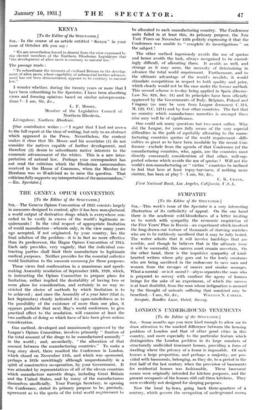THE GENEVA OPIUM CONVENTION
[To the Editor of the SPECTATOR.] Sin,—The Geneva Opium Convention of 1925 consists largely in measures designed to control, after it has been manufactured, a world output of derivative drugs which is everywhere con- ceded to be vastly in excess of the world's legitimate re- quirements ! In the vital respect of appropriate limitation of world manufacture—wherein only, in the view many years ago accepted, if not originated, by your country, lies the final solution of the problem—it is in fact no more effective than its predecessor, the Hague Opium Convention of 1912. Each only provides, very vaguely, that the individual con- tracting parties shall limit their manufacture to legitimate medical purposes. Neither provides for the essential collective world limitation to the amounts necessary for those purposes.
These views find confirmation in a unanimous and epoch- making Assembly resolution of September 24th, 1929, which, in instructing the Opium Committee to prepare plans for limitation, rather implied the desirability of having two or more plans for consideration, and certainly in no way re- stricted the choice of methods by which limitation is to be achieved ; and since the Assembly of a year later (that is, last September) clearly. indicated its open-mindedness as to the possibility of the existence of more than one plan, it appears probable that next May's world conference, to give practical effect to the resolution, will examine at least the Iwo methods of doing so which have of late been given serious consideration.
One method, developed and unanimously approved by the League's Opium Committee, involves primarily fixation of the total amount of the drugs to be manufactured annually " in the world ; and, secondarily, the allocation of that amount between the manufacturing countries." To make a Jong story short, there resulted the Conference in London, which closed on November 11th, and. which was sponsored, perhaps. a little unwittingly although unquestionably in a spirit of :constructive co-operation, by..your Government. It was attended by representatives of all of the eleven countries which manufacture narcotic drugs, including Great Britain and the United States, and by many of the manufacturers thanselves unofficially. Your Foreign Secretary, in opening the Conference, stated its primary purpose to be, precisely, agreement as to the quota of the total world requirement to
be allocated to each manufacturing country. The Conference quite failed in at least this, its primary purpose, the New York Times on November 13th politely expressing it that the Conference was unable to " complete its investigations " on the subject !
The other method ingeniously avoids the use of quotas and hence avoids the task, always recognized to be exceed- ingly difficult, of allocating them. It avoids as well, and strange as it may seem, the necessity of determining in advance the total world requirement. Furthermore, and to the ultimate advantage of the world's invalids, it would stimulate competition in respect to both quality and price, which clearly would not be the case under the former method. This second scheme is to-day being applied in Spain (Decree- Law No. 824, Sec. 51) and its principles have been officially approved by the Governments of Italy, Belgium, Poland and Uruguay (as may be seen from League document C. 314, M. 122, O.C. 1211) and by four other countries. The fact that no country which manufactures narcotics is amongst these nine may well be of significance.
One could ask many questions but two must suffice. Why did the League, for years fully aware of the very especial difficulties in the path of equitably allocating to the manu- facturing countries quotas of the world requirement—diffi- culties so great as to have been insoluble by the recent Con- ference—exclude from the agenda of that Conference (of the manufacturing countries, who, again, are the countries most directly concerned) consideration of that other, well-sup- ported scheme which avoids the use of quotas ? Will not the world's non-manufacturing or " victim countries be inclined to feel that here at least topsy-turviness, if nothing more sinister, has been at play am, Sir, &c.,
C. K. CRANE.
first National Rank, Los Angeles, California, U.S.A.


































 Previous page
Previous page